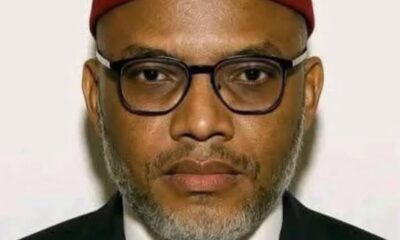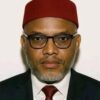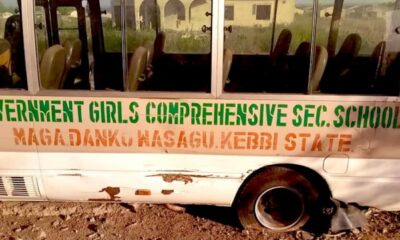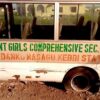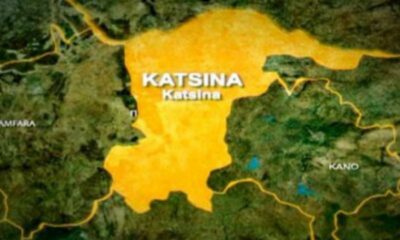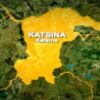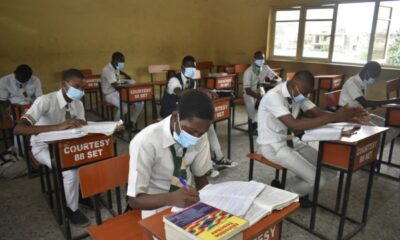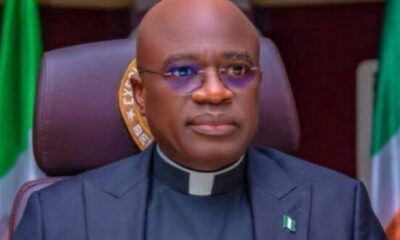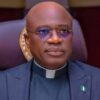News
Tinubu Seeks Approval To Raise $2.8bn From International Capital Market

President Bola Tinubu on Tuesday formally wrote to the House of Representatives requesting a legislative resolution to authorise Nigeria’s entry into the international capital market to raise an aggregate of $2.847 billion.
The letter by the President came the same day the Nigerian National Petroleum Company Limited (NNPC) formally responded to all 19 questions raised by the Senate Committee on Public Accounts concerning the alleged unaccounted N210 trillion discovered in its audited financial statements covering 2017 to 2023.
The request by Tinubu, dated 22nd September 2025, which was addressed to the Speaker of the House, Rt. Hon. Tajudeen Abbas was submitted under the authority of Sections 21(1) and 27(1) of the Debt Management Office (Establishment) Act, 2003.
Tinubu outlined four key components within the request which included: the implementation of new external borrowing totalling N1,843,669,786,987.16 which equivalent to $1,229,113,000.00 at the 2025 budget exchange rate of N1,500/$1 as provided for in the 2025 Appropriation Act; the refinancing of maturing Eurobonds worth $1,118,352,000.00 issued at 7.625 percent interest, maturing on November 21, 2025; permission to raise the combined $2.347 billion through a mix of Eurobonds, loan syndications, bridge finance facilities, or direct borrowing from international financial institutions; and the issuance of a debut Sovereign Sukuk worth up to $500 million in the international capital market, with or without credit guarantees.
The President clarified that the 2025 Appropriation Act authorises a total of N9,276,348,934,935.79 in new borrowings to fund the budget deficit, of which N7,432,679,147,948.63 was to be sourced domestically and N1,843,669,786,987.16 to be sourced externally.
He emphasised that the external component was vital for the execution of the national budget and requested that the House of Representatives issue a resolution permitting the federal government to raise this sum through various funding options available in the international capital market.
These include the issuance of Eurobonds, the use of bridge financing from bookrunners, syndicated loans, or borrowing directly from international financial institutions.
Addressing the issue of the maturing Eurobond, Tinubu drew attention to the impending repayment of a $1.118 billion bond issued on November 21, 2018, at a 7.625 percent interest rate and a tenor of seven years.
The President stated that the bond, which would mature on November 21, 2025, needs to be refinanced to prevent a potential default.
He proposed that this refinancing could also be achieved through the issuance of Eurobonds, bridge finance, syndicated loans, or direct borrowing, depending on which option provides the best financial terms.
According to Tinubu, this approach was consistent with international best practices in managing sovereign debt obligations in capital markets.
In the broader context of raising external capital, the President stated that the total sum to be raised —comprising the $1.229 billion for new borrowing and $1.118 billion for Eurobond refinancing would amount to $2.347 billion.
He indicated that Nigeria’s status as a regular issuer in the international capital market places it in a favourable position to raise this amount, subject to prevailing market conditions.
Tinubu acknowledged that Eurobond issuance was inherently market-driven, with final terms such as pricing and tenor only determinable at the time of issuance.
He assured lawmakers that the Federal Ministry of Finance and the Debt Management Office would work closely with transaction advisers to secure the most favourable terms for Nigeria.
He also presented data on current yields for Nigeria’s outstanding Eurobonds as of 8th September 2025, showing interest rates ranging from 6.845 percent to 9.288 percent across maturities from 2029 to 2051, providing a basis for determining the pricing of the new bond issuance.
In addition to the bond issuance and refinancing, the President sought legislative approval for the issuance of a stand-alone, debut Sovereign Sukuk of up to $500 million in the international capital market.
Tinubu noted that Nigeria had successfully used domestic Sukuk instruments to raise N1.392 trillion between September 2017 and May 2025, to finance key road infrastructure projects across the country.
However, he emphasised that external Sukuk issuance was necessary to supplement domestic resources and close the country’s widening infrastructure funding gap.
He further argued that launching a Sovereign Sukuk in the international market would not only diversify Nigeria’s funding sources but also deepen the country’s debt and investor base.
The President explained that the proposed $500 million international Sukuk issuance may be carried out with or without a credit enhancement from the Islamic Corporation for the Insurance of Investment and Export Credit (ICIEC), a subsidiary of the Islamic Development Bank (IsDB) Group.
He said the ICIEC has provided an indicative term sheet for the guarantee, which includes a policy premium of 3.5 percent of the issue amount per annum.
“If the ICIEC guarantee is accepted, 25 percent of the Sukuk proceeds could be used to repay high-interest debt, while the remaining 75 percent would be used to finance pre-identified infrastructure projects.
“This credit-enhanced approach is expected to improve investor appetite and reduce overall borrowing costs,” he added.
Also, Tinubu formally requested that the House of Representatives pass a resolution authorising the federal government to raise the proposed $2.347 billion through any combination of Eurobond issuance, bridge finance, loan syndication, or multilateral borrowing.
He also requested approval to issue a $500 million debut Sovereign Sukuk, with or without credit enhancement from ICIEC.
He urged the House to act expeditiously, given the urgent fiscal and debt management timelines, and concluded by extending his highest regards to the Speaker and the House.
Meanwhile, NNPC has formally responded to all 19 questions raised by the Senate Committee on Public Accounts concerning the alleged unaccounted N210 trillion discovered in its audited financial statements covering 2017 to 2023.
Chairman of the Committee, Senator Aliyu Wadada, confirmed this development on Tuesday, saying the company’s responses had been received and were awaiting presentation before the full committee for consideration.
“NNPCL has provided answers to all the 19 questions, yes, I can confirm that to you. What we are waiting for now is to lay these answers before the committee,” Wadada stated.
While he declined to disclose the content of NNPC’s responses, Wadada explained that the committee would review them in detail during its next sitting before taking a position.
He said, “They could either be positive or negative. Only a comprehensive review by the committee would determine their adequacy.”
The ongoing probe followed the report of the Office of the Auditor-General for the Federation, which had flagged N210 trillion in discrepancies in the NNPC’s books, broken down into N103 trillion in liabilities and N107 trillion in assets yet to be fully reconciled.
The Senate panel had launched the investigation before embarking on its annual recess on July 23, but reconvened briefly on July 29, to question the Group Chief Executive Officer, Mr. Bayo Ojulari, who was appearing for the first time after several earlier invitations.
During that meeting, Senator Wadada clarified that the probe was not an indictment or an accusation of theft, but a constitutional oversight function aimed at clarifying audit queries.
“At no time did this committee say the N210 trillion was stolen or missing. What we are doing is a required investigation into queries raised by the Auditor-General,” he had explained.
Ojulari, who had only been in office for just over 100 days at the time, had requested additional time to thoroughly address the issues.
He had assured the senators that the company would engage both internal and external auditors to provide comprehensive answers.
“I need time to understand the issues myself so I can respond appropriately. I will get a team and engage the external auditors and other relevant groups to ensure the queries are fully addressed,” Ojulari said at the earlier session.
With the company’s responses now submitted, the next step is for the Senate Committee to evaluate them and determine whether the explanations provided sufficiently address the audit concerns raised in the Auditor-General’s report.
Besides, the African Development Bank (AfDB) will lend Nigeria $500 million this year as part of a $1 billion budget support programme, following economic reforms introduced by President Bola Tinubu, an Executive Director of the Bank, Bode Oyetunde, has said.
Oyetunde, who represents Nigeria and São Tomé and Príncipe on the AfDB board, told Reuters that the loan could be approved before year-end.
“We have been working strongly to support Nigeria’s very bold and aggressive macroeconomic reforms under President Tinubu. Given all these reforms, it was important to support Nigeria,” Oyetunde told Reuters on the sidelines of the Nigerian Economic Summit in Abuja.
“They asked us for $1.5 billion. We are able to do $1 billion over two years. Last year, we provided $500 million in budget support. This year, we are looking to do another $500 million, subject to board approval,” he added.
The West African nation, Africa’s most populous, has embarked on a bold transformation since Tinubu took office in May 2023. His government has removed fuel subsidies, unified foreign exchange rates, and launched tax reforms aimed at stabilising public finances and attracting investment.
Oyetunde added that the bank is focusing on fiscal and power sector reforms as part of its support programme.
Meanwhile, Sub-Saharan African economies are expected to grow by a faster 3.8 per cent this year on the back of stable prices that have spurred easing by policymakers, the World Bank said on Tuesday, and the momentum will increase in the next two years.
The upgrade from 3.5 per cent in April was driven by stabilising foreign exchange and inflation rates in countries like Ethiopia, giving room for interest rate cuts, the bank said in its biannual Africa Pulse report.
“These favourable conditions are fuelling a recovery in private consumption and investment,” the bank said in the report. However, fiscal consolidation efforts could curb the pace of recovery in some economies, the report warned.
Growth will accelerate to an annual average of 4.4 per cent in the next two years, the bank said, slightly up from an initial forecast of 4.3 per cent.
Growth prospects for 30 economies out of the 47 that make up the region as defined by the bank were revised upwards, the report found.
“The median inflation is less than 4 per cent. Moreover, most of the currencies which were cratering relative to the U.S. dollar have now recovered and are stable,” Andrew Dabalen, chief economist for Africa at the World Bank, told a news briefing.
A softer dollar has added to a benign backdrop for emerging markets more widely, with the greenback weakening nearly 10 per cent since the start of the year, a Reuters report said.
The bank upgraded growth forecasts for Ethiopia, Nigeria and Ivory Coast – all major economies in the region. Real incomes are also growing at a faster rate this year and into the next two years, the World Bank said.
“While this marks a gradual recovery from a decade of successive shocks, the rebound has yet to gain strong momentum,” it said in the report.
The regional economic outlook, however, faces risks from trade uncertainty sparked by the policies of the US President Donald Trump, high debt burdens and the need to create jobs for millions of young people coming into the job market.
“Trade challenges remain very high. We don’t know how this is going to be resolved because there are lots of negotiations going on,” Dabalen said, citing the expiry of AGOA, a key trade agreement between the United States and African nations.
The World Bank urged governments to focus on the creation of good jobs by improving the general business environment, in order to nurture small and mid-sized firms.
“These jobs have to be jobs that provide a living wage and secure lives,” Dabalen said, adding three quarters of the jobs created in the region’s economies are in the informal sector.
Lack of employment opportunities and other grievances have sparked youth-led protests in Kenya, Nigeria and Madagascar since last year, showing the scale of the challenge for policymakers.
“The consequences of not solving these problems are hard to contemplate. They will be very disruptive and I think we’re beginning to see the signs of it,” Dabalen noted.


